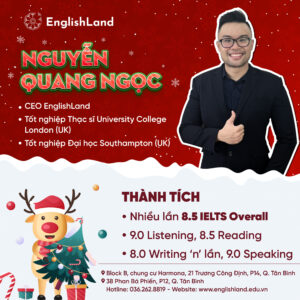TASK 2 (AGREE OR DISAGREE): JOB INTERVIEWS
Interviews form the basic selecting criteria for most large companies. However, some people think that the interview is not a reliable method of choosing whom to employ.
To what extent do you agree or disagree?
Sample Answer
In the professional realm, it is self-evident that job interviews play a fundamental role in the hiring process of most large corporations, thereby relegating other evaluation strategies to secondary positions. This has prompted many to question the reliability of interviewing prospective candidates, with some criticising this method as lacking comprehensiveness and practicality. I agree with this viewpoint, albeit with some reservations.
Proponents of continuing to rely on job interviews contend that this assessment method is the most effective way to recruit suitable candidates. From their perspective, a face-to-face or online interview presents the most direct opportunity for companies to evaluate a potential candidate in terms of demeanour, temperament, and compatibility with corporate culture. This is based on the assumption that an individual’s personality, willingness to cooperate, and alignment with the company’s values can be effectively conveyed through multi-directional conversation and direct feedback.
However, interviews alone as an assessment strategy tend to overemphasise attributes such as verbal articulation, personal charisma, and quick thinking, while overlooking other equally, if not more, important qualities such as competence, emotional intelligence, resilience, and integrity. A candidate who performs exceptionally well in interviews may still lack professional expertise, compassion, patience, or honesty, potentially leading to financial losses and reputational damage for businesses. This drawback can be partially mitigated by conducting multiple types of interviews, such as general, technical, and panel formats, to reduce the likelihood of hiring unsuitable candidates.
To further support my assertion, the employment process should be comprehensive, utilising a variety of evaluation techniques to identify the most suitable candidates. Phone interviews, for example, can be conducted after the initial screening of applications to assess basic communication skills, confidence, and consistency of information. Once applicants are shortlisted, they should attend an assessment centre, the scope of which largely depends on the scale of the company. In most cases, when job seekers apply for a large conglomerate, the assessment centre may include activities such as group debates, individual presentations, and in-tray exercises. In addition, companies often employ a wide range of aptitude, situational, and psychological tests to evaluate candidates’ adaptability, sensitivity, and competence in various scenarios, thereby enhancing the selection process. These combined testing methods demonstrate that interviews, as a stand-alone strategy, are less effective and practical in today’s dynamic world.
In conclusion, while I acknowledge the usefulness of interviews in gaining quick insights into candidates, this method often prioritises superficial attributes while overlooking key qualities conducive to professional success. Ideally, a holistic approach that combines interviews with diverse evaluation techniques would be a more practical and effective strategy, contributing to the development of a sustainable, principled, and competent workforce.
Marking by Chat GPT 5
TỪ VỰNG HAY
Interviews form the basic selecting criteria for most large companies. However, some people think that the interview is not a reliable method of choosing whom to employ.
To what extent do you agree or disagree?
In the professional realm, it is self-evident that job interviews play a fundamental role in the hiring process of most large corporations, thereby relegating other evaluation strategies to secondary positions. This has prompted many to question the reliability of interviewing prospective candidates, with some criticising this method as lacking comprehensiveness and practicality. I agree with this viewpoint, albeit with some reservations.
Proponents of continuing to rely on job interviews contend that this assessment method is the most effective way to recruit suitable candidates. From their perspective, a face-to-face or online interview presents the most direct opportunity for companies to evaluate a potential candidate in terms of demeanour, temperament, and compatibility with corporate culture. This is based on the assumption that an individual’s personality, willingness to cooperate, and alignment with the company’s values can be effectively conveyed through multi-directional conversation and direct feedback.
However, interviews alone as an assessment strategy tend to overemphasise attributes such as verbal articulation, personal charisma, and quick thinking, while overlooking other equally, if not more, important qualities such as competence, emotional intelligence, resilience, and integrity. A candidate who performs exceptionally well in interviews may still lack professional expertise, compassion, patience, or honesty, potentially leading to financial losses and reputational damage for businesses. This drawback can be partially mitigated by conducting multiple types of interviews, such as general, technical, and panel formats, to reduce the likelihood of hiring unsuitable candidates.
To further support my assertion, the employment process should be comprehensive, utilising a variety of evaluation techniques to identify the most suitable candidates. Phone interviews, for example, can be conducted after the initial screening of applications to assess basic communication skills, confidence, and consistency of information. Once applicants are shortlisted, they should attend an assessment centre, the scope of which largely depends on the scale of the company. In most cases, when job seekers apply for a large conglomerate, the assessment centre may include activities such as group debates, individual presentations, and in-tray exercises. In addition, companies often employ a wide range of aptitude, situational, and psychological tests to evaluate candidates’ adaptability, sensitivity, and competence in various scenarios, thereby enhancing the selection process. These combined testing methods demonstrate that interviews, as a stand-alone strategy, are less effective and practical in today’s dynamic world.
In conclusion, while I acknowledge the usefulness of interviews in gaining quick insights into candidates, this method often prioritises superficial attributes while overlooking key qualities conducive to professional success. Ideally, a holistic approach that combines interviews with diverse evaluation techniques would be a more practical and effective strategy, contributing to the development of a sustainable, principled, and competent workforce.
Vocabulary
- professional realm – lĩnh vực chuyên môn
- play a fundamental role – đóng vai trò cốt lõi
- hiring process – quy trình tuyển dụng
- reliability of interviewing prospective candidates – độ tin cậy của phỏng vấn ứng viên
- lacking comprehensiveness and practicality – thiếu toàn diện và tính thực tiễn
- demeanour, temperament, and compatibility with corporate culture – phong thái, tính khí, sự phù hợp với văn hoá DN
- willingness to cooperate / alignment with the company’s values – sẵn sàng hợp tác / phù hợp giá trị công ty
- multi-directional conversation – cuộc trao đổi đa chiều
- overemphasise attributes such as verbal articulation, personal charisma, and quick thinking – quá nhấn mạnh khả năng nói, sự cuốn hút, phản ứng nhanh
- competence, emotional intelligence, resilience, and integrity – năng lực, trí tuệ cảm xúc, khả năng phục hồi, liêm chính
- financial losses and reputational damage – thiệt hại tài chính và uy tín
- multiple types of interviews (general, technical, panel formats) – nhiều dạng phỏng vấn (chung, kỹ thuật, hội đồng)
- reduce the likelihood of hiring unsuitable candidates – giảm khả năng tuyển sai người
- initial screening of applications – sàng lọc hồ sơ ban đầu
- assessment centre – trung tâm đánh giá tuyển dụng
- conglomerate – tập đoàn lớn
- aptitude, situational, and psychological tests – bài kiểm tra năng lực, tình huống, tâm lý
- adaptability, sensitivity, and competence – khả năng thích nghi, sự nhạy bén, năng lực
- holistic approach – cách tiếp cận toàn diện
- development of a sustainable, principled, and competent workforce – xây dựng đội ngũ lao động bền vững, nguyên tắc, có năng lực
✔ DÀN Ý
Mở bài
- Thực tế: Job interviews đóng vai trò quan trọng trong quy trình tuyển dụng của hầu hết tập đoàn lớn.
- Tranh luận: Tuy nhiên, nhiều ý kiến cho rằng phỏng vấn không đủ tin cậy → cần cách tiếp cận toàn diện.
- Lập trường cá nhân: Đồng ý với hạn chế của phỏng vấn, nhưng thừa nhận có ích trong mức độ nhất định.
Thân bài 1 – Quan điểm ủng hộ phỏng vấn
- Ưu điểm chính: Cách trực tiếp nhất để đánh giá ứng viên.
- Khía cạnh đánh giá: demeanour (phong thái), temperament (tính khí), sự phù hợp với corporate culture.
- Giá trị: Thể hiện personality, willingness to cooperate, alignment with company’s values qua trao đổi trực tiếp.
Thân bài 2 – Hạn chế của phỏng vấn
- Thiên lệch: Quá tập trung vào verbal articulation, charisma, quick thinking.
- Thiếu sót: Bỏ qua competence, emotional intelligence, resilience, integrity.
- Rủi ro: Ứng viên “nói hay” nhưng thiếu expertise, honesty → dẫn tới financial losses & reputational damage.
- Giải pháp hạn chế: Kết hợp nhiều loại interview (general, technical, panel).
Thân bài 3 – Giải pháp toàn diện
- Quy trình đa dạng: Utilise multiple evaluation techniques.
- Phone interviews → kiểm tra communication, confidence, consistency.
- Assessment centre → group debates, presentations, in-tray exercises.
- Bài test bổ trợ: Aptitude, situational, psychological tests → đánh giá adaptability, sensitivity, competence.
- Ý nghĩa: Kết hợp phương pháp → quá trình tuyển chọn công bằng, hiệu quả hơn.
Kết bài
- Khẳng định: Phỏng vấn có ích nhưng dễ thiên lệch → không đủ để đảm bảo chọn đúng người.
- Giải pháp tối ưu: Holistic approach = interviews + diverse evaluation → xây dựng workforce bền vững, nguyên tắc, có năng lực.


